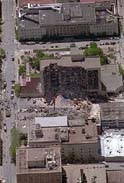FBI sought Russian satellite photos after Oklahoma City bombing
In the months after the 1995 Oklahoma City bombing, the FBI was trying to buy satellite photographs from a Russian company in an effort to track the movements of Timothy McVeigh, a newly released FBI teletype shows.

It was the latest disclosure ordered by U.S. District Judge Dale A. Kimball to a Salt Lake City insurance lawyer dogging the FBI for information about its handling of the bombing investigation.
The lawyer, Jesse Trentadue, is trying to find evidence he contends will show federal agents were tipped to McVeigh's plans but failed to stop the bombing that gutted a federal office building and killed 168. McVeigh was convicted on federal murder charges and executed in 2001.
Trentadue said the FBI's effort to buy Russian satellite photographs was a new disclosure.
"I never heard of that, period. Nothing," Trentadue said Wednesday by telephone from Spain, where he was vacationing. "We're buying photographs from the Russians?"
The FBI had no immediate comment on a day when its director, Robert Mueller, was visiting the bureau's Salt Lake City office.
Last December, an Oklahoma newspaper reported that in the days after the bombing, the U.S. government trained a spy satellite on a white separatist compound in Oklahoma, where McVeigh sought refuge before the bombing.
About two months after the bombing, the FBI turned to a Russian company for satellite pictures of "certain" places in the continental U.S. at "pertinent" times, according to the teletype.
The Russians may have been training satellites on the Kansas military installation at Fort Riley, near Junction City, Kansas, where McVeigh rented a Ryder truck that would be packed with explosives.
The Russian company, Sovinformsputnik, did not have the pictures the bureau was looking for, according to the teletype.
The FBI also issued several other teletypes showing agents were reading a lot of newspaper accounts of the Oklahoma City bombing for tips and clues. Those teletypes already have been released to Trentadue, but many passages were blacked out. The new release left the names of newspapers in the teletypes.
Trentadue said he will continue fighting for more FBI disclosures he believes could help explain the death of his brother, whom he believes was mistaken for McVeigh's "John Doe 2", a suspect never identified.
Kenneth Trentadue, a convicted bank robber picked up on a parole violation, turned up dead at a federal prison at Oklahoma City shortly after McVeigh's indictment for the bombing.
The Bureau of Prisons said he committed suicide by hanging. Jesse Trentadue believes his 44-year-old brother was killed during an interrogation gone awry, reports AP.
O.Ch.
Subscribe to Pravda.Ru Telegram channel, Facebook, RSS!


